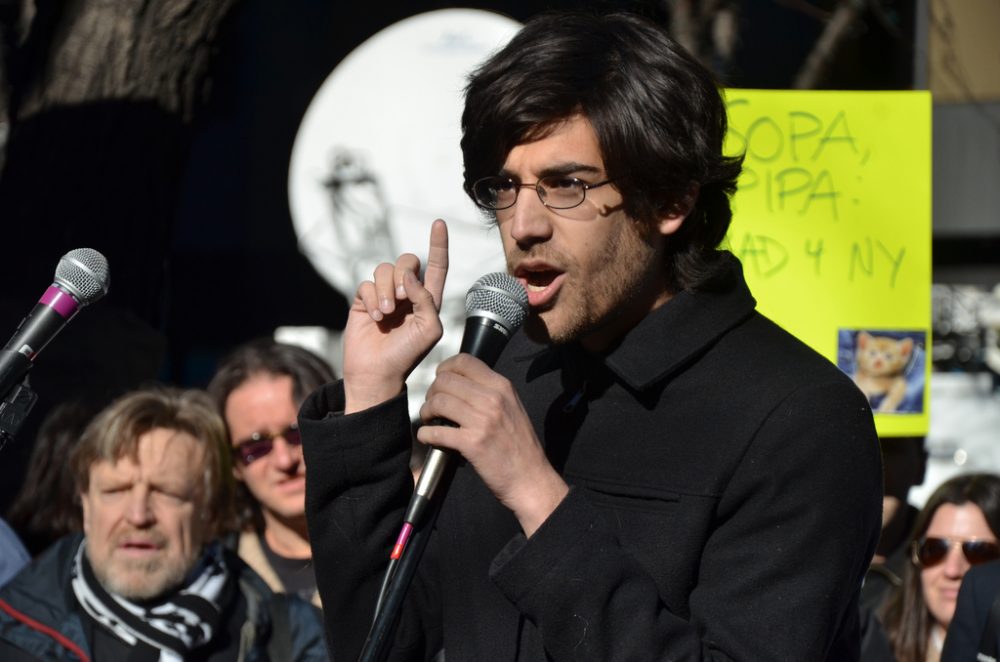Advertisement
Documentary Offers A New Look At 'The Internet's Own Boy,' Aaron Swartz
Resume
The Independent Film Festival Boston began this week and runs through April 30. One of the films featured in the festival is "The Internet's Own Boy: The Story of Aaron Swartz".
Swartz is the late pioneering computer programmer and internet activist who was arrested and charged with 13 felony counts for illegally downloading data from JSTOR, a digital library of scholarly journals. Both JSTOR and MIT, where he made the illegal downloads, later recused themselves from the case, but the Justice Department pushed forward, threatening Swartz with up to 35 years in prison and a fine of up to $1 million.
"He had basically stopped working on anything else and the case was, in fact, taking over his whole life," said Swartz's former girlfriend, Taren Stinebrickner-Kauffman, who is featured in the documentary. "Many people go through life without ever having something like two years of total uncertainty about what your future is, a 100 percent drain on your financial resources and especially someone as sensitive as Aaron."
On January 11, 2013, Swartz committed suicide. He left behind a legacy of groundbreaking programming, political activism and questions surrounding the zeal with which government prosecutors choose to apply such laws as the Computer Fraud and Abuse Act.
Guest
Brian Knappenberger, director of "The Internet's Own Boy," which screens at the Somerville Theatre on Monday. He tweets at @knappB.
Highlights
On how the director came to make the film:
Brian Knappenberger: "I made a film called 'We Are Legion: The Story of the Hacktivists' which followed the hacktivist collective non-group, Anonymous. And I was on a panel talking about hacktivist activity about a week after Aaron died and on the panel with me was Quinn Norton, who's an ex-girlfriend of Aaron's and pretty much everybody at this symposium that we were at knew him and, understandably, it was a very somber affair and that's really when the film started. I wasn't sure I was actually making a full-length documentary film, actually, for a couple of months and then a few months later I had a long conversation with Aaron's father. And I, by coincidence, had lost a friend to suicide about four months before that and I'd also become a new father myself. It was this very moving conversation that I had with Aaron's father who'd just lost a son, I'd just lost a friend. I'd become a new father. So there was kind of a moment where it became obvious that I was going to make this film."
On Aaron's tendency to question everything:
BK: "I think that drove him through his whole life. In fact, he wrote in one of his blogs that what he thinks most people mean when they say intelligence is just really curiosity."
On whether Aaron understood the consequences to his single-minded determination to change the world:
BK: "Yeah, I think he was aware of consequences. I mean, I think that he just saw that if you are in a position to make a change — if you have skills that can affect some sort of change — then there's no good reason not to do that. I've made two films now about hackers and I've certainly met people who are done with the system and are ready to just burn it to the ground and start over. This isn't Aaron. Aaron, I think, wanted to work within the system — wanted to hack the system in the best possible sense. In the sense of making it better. But it kind of speaks to the broader hacker ethos. I think it's one of the reasons why I'm drawn to hacker stories in general, or to the hacking community. They seem to be engaged in this relentless pursuit of the truth. They seem to have an enormously low tolerance for nonsense and lies. They route around these walls of deception."
On Aaron Swartz's prosecution:
BK: "The prosecutors, in this case, told Aaron's dad that they needed a case for deterrence. They needed someone to make an example out of. And I think that automatically begs the question, deterring what? What kind of example were they trying to make, here? Yes, Aaron is a hacker in the broad sense of the word, but the majority of his activity, to me, seemed to be political organizing. And it's being prosecuted in a time where we were struggling to recovery from this financial meltdown and none of the people involved in that have been prosecuted in any real or significant sense. So where do our priorities lie?"
On Aaron's struggle with himself:
BK: "We go through some of his early blog posts where he talks about going in the bathroom and crying and things like that at his first job at Conde Nast and this disconnect that he felt at times. We also talked to his girlfriend, Taren, the girlfriend at the time of his passing, who says that she believed that, at some point in his early 20s, that he probably did have something like a clinical definition of depression. But she doesn't believe that was the case when he was living with her. We definitely explore that territory and try to understand — he seemed to carry the weight of the world on his shoulders."
More
The Boston Globe: Independent Film Festival Boston Is Full Of Choices
- "Brian Knappenberger’s documentary portrait of Swartz, the digital freedom activist who hanged himself in 2013 as the US Department of Justice prepared a case against him, is a work of eulogy and sorrow, intent on ennobling its subject and on working audiences into a pitch of angry righteousness."
This segment aired on April 25, 2014.